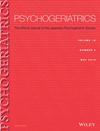The effectiveness of a fall detection device in older nursing home residents: a pilot study
IF 1.7
4区 医学
Q3 GERIATRICS & GERONTOLOGY
引用次数: 0
Abstract
BackgroundReal‐world research to evaluate the effect of device technology in preventing fall‐related morbidity is limited. This pilot study aims to investigate the effectiveness of a non‐wearable fall detection device in older nursing home residents.MethodsThe study was conducted in a nursing home with single‐resident rooms. Fall detection devices were randomly set up in half of the rooms. Demographic data, comorbidities, lists of medications, and functional, nutritional, and frailty status were recorded. The residents were followed up for 3 months. The primary outcome was falls and the secondary outcome was all‐cause mortality.ResultsA total of 26 participants were enrolled in the study. The study group consisted of 13 residents who had a fall detection device in their rooms. The remaining 13 residents on the same floor formed the control group. Participants had a mean age of 82 ± 10 years and 89% of the residents were female. The most prevalent comorbidity was dementia. Two residents from the control group and one resident from the study group experienced a fall event during follow‐up. The fall events in the control group were identified retrospectively by the nursing home staff, whereas the fall in the study group received a prompt response from the staff who were notified by the alarm. One resident was transferred to the hospital and died due to a non‐fall related reason.ConclusionDevice technology may provide an opportunity for timely intervention to prevent fall‐related morbidity in institutionalized older adults.养老院老年居民跌倒检测装置的有效性:一项试点研究
背景评估设备技术在预防跌倒相关发病率方面效果的实际研究非常有限。本试验研究旨在调查非穿戴式跌倒检测装置对老年疗养院居民的有效性。在一半的房间中随机安装了跌倒检测装置。记录人口统计学数据、合并症、药物清单以及功能、营养和虚弱状况。对住户进行了为期 3 个月的随访。主要结果是跌倒,次要结果是全因死亡率。研究组包括 13 名在房间内安装了跌倒检测装置的居民。同一楼层的其余 13 位居民组成对照组。参与者的平均年龄为 82 ± 10 岁,89% 的居民为女性。最常见的合并症是痴呆症。在随访期间,对照组和研究组分别有两名和一名居民发生了跌倒事件。对照组中的跌倒事件是由疗养院工作人员事后发现的,而研究组中的跌倒事件则是由接到警报通知的工作人员及时处理的。结论:设备技术可以提供及时干预的机会,预防养老院中老年人与跌倒相关的发病率。
本文章由计算机程序翻译,如有差异,请以英文原文为准。
求助全文
约1分钟内获得全文
求助全文
来源期刊

Psychogeriatrics
Medicine-Geriatrics and Gerontology
CiteScore
3.60
自引率
5.00%
发文量
115
审稿时长
>12 weeks
期刊介绍:
Psychogeriatrics is an international journal sponsored by the Japanese Psychogeriatric Society and publishes peer-reviewed original papers dealing with all aspects of psychogeriatrics and related fields
The Journal encourages articles with gerontopsychiatric, neurobiological, genetic, diagnostic, social-psychiatric, health-political, psychological or psychotherapeutic content. Themes can be illuminated through basic science, clinical (human and animal) studies, case studies, epidemiological or humanistic research
 求助内容:
求助内容: 应助结果提醒方式:
应助结果提醒方式:


